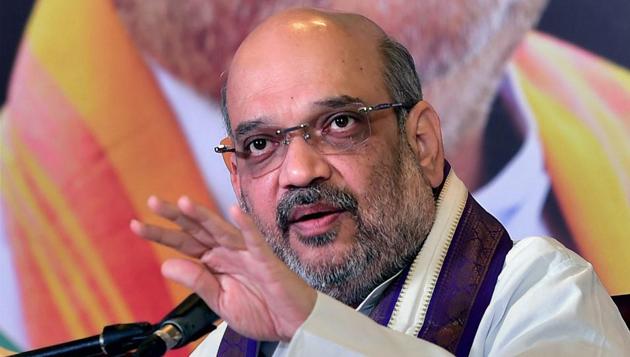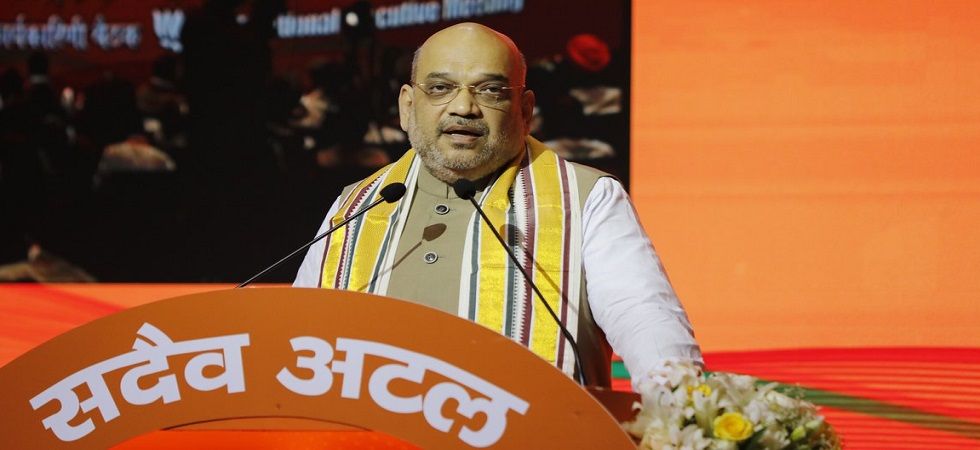BJP’s CM will be from backward class if elected to power in Telangana, says Amit Shah

BJP’s CM will be from backward class if elected to power in Telangana, says Amit Shah
Union Home Minister Amit Shah’s recent statement at an election rally in Suryapet, Telangana, highlights the Bharatiya Janata Party’s (BJP) commitment to promoting social inclusivity and representation in state leadership. By emphasizing the selection of a leader from the Backward Class for the chief minister’s position, Shah underscores the party’s dedication to ensuring equitable political representation and empowerment for marginalized communities in the state.
The Home Minister’s call to the people of Telangana to elect a BJP government reflects the party’s ambition to expand its political presence in the region, with a focus on addressing the concerns and aspirations of various social groups, including those belonging to the Backward Class. By making this assurance, Shah aims to garner support from diverse segments of the population and establish the BJP as a party that champions the interests of marginalized communities and promotes inclusive governance.
This announcement also underscores the significance of social and political representation in contemporary Indian politics, emphasizing the importance of diverse perspectives and voices in the decision-making process. By committing to the selection of a leader from the Backward Class for the chief minister’s role, the BJP seeks to promote a more inclusive and representative form of governance, one that is responsive to the needs and aspirations of all sections of society.
representation in contemporary Indian politics, emphasizing the importance of diverse perspectives and voices in the decision-making process. By committing to the selection of a leader from the Backward Class for the chief minister’s role, the BJP seeks to promote a more inclusive and representative form of governance, one that is responsive to the needs and aspirations of all sections of society.
Overall, Amit Shah’s statement reflects the BJP’s commitment to fostering social inclusivity and empowering marginalized communities in Telangana, demonstrating the party’s efforts to address the concerns of underrepresented groups and promote a more equitable and representative political landscape.
Union Home Minister Amit Shah’s comments at the election rally in Suryapet, Telangana, reflect the ongoing political narrative that highlights the contrasts between the BJP and other political parties, particularly the Congress and the ruling BRS. By accusing both the Congress and the BRS of being dynastic parties, Shah aims to underscore the BJP’s position as a party that prioritizes governance and development over familial politics and dynastic tendencies.
Shah’s criticism of the Congress and the BRS as parties that prioritize the welfare of their respective families aligns with the BJP’s narrative of focusing on the welfare of the nation and its citizens. By contrasting the BJP’s purported commitment to the welfare of the poor with the alleged dynastic agendas of the Congress and the BRS, Shah seeks to appeal to the electorate by presenting the BJP as a party that prioritizes the interests of the broader population over the interests of a select few.

Furthermore, Shah’s accusations of the BRS being anti-poor, anti-Dalit, and anti-OBC are aimed at discrediting the ruling party’s governance and policies, while positioning the BJP as a more inclusive and pro-development alternative. By highlighting these alleged shortcomings, Shah attempts to persuade the electorate to support the BJP in the upcoming elections, emphasizing the party’s commitment to inclusive development and social welfare.
Overall, Amit Shah’s statements at the rally are part of the broader political discourse aimed at emphasizing the BJP’s commitment to good governance, development, and inclusivity, while portraying the Congress and the ruling BRS as parties with dynastic tendencies and limited interests in the welfare of the broader population.
Union Home Minister Amit Shah’s critical questions directed at Chief Minister K Chandrasekhar Rao (KCR) highlight the BJP’s efforts to hold the ruling party accountable for its election promises and policy commitments. By questioning the fulfillment of specific assurances made by the Chief Minister, such as the appointment of a Dalit leader as the chief minister and the allocation of three acres of land to Dalits, Shah seeks to draw attention to potential gaps between political rhetoric and actual implementation.
The inquiries regarding the allocation of the promised budget for the welfare of Scheduled Castes (SCs) and the Backward Class highlight the BJP’s focus on monitoring the state government’s performance in addressing the welfare and development needs of marginalized communities. By raising these questions, Shah aims to underscore the importance of transparency and accountability in governance, emphasizing the need for concrete actions and tangible outcomes to fulfill the commitments made to these communities.
Furthermore, Shah’s reference to the initiatives undertaken by the Modi government for the welfare of the Backward Class serves to showcase the BJP’s commitment to the upliftment and empowerment of marginalized communities at the national level. By highlighting the measures introduced by the central government, including the establishment of a Backward Class Commission and the grant of constitutional status to the Backward Class, Shah aims to emphasize the BJP’s proactive approach to addressing the welfare and development needs of marginalized communities across the country.
Overall, Amit Shah’s comments reflect the BJP’s strategy of highlighting the alleged shortcomings of the ruling party in fulfilling its promises and commitments, while showcasing the central government’s initiatives for the welfare and empowerment of marginalized communities. This approach aims to strengthen the BJP’s position as a party that prioritizes the welfare and development of all sections of society, particularly marginalized and underprivileged communities.
Union Home Minister Amit Shah’s recent statements underscore the Bharatiya Janata Party (BJP) government’s commitment to the development and welfare of Telangana, as well as the party’s focus on cultural and religious issues of national significance.
By highlighting the substantial financial investment of Rs 25 lakh crore for Telangana’s development over the past nine years, Shah aims to showcase the Modi government’s dedication to fostering economic growth and infrastructure development in the state. This emphasis on the significant financial support provided by the central government underscores the BJP’s efforts to position itself as a party committed to addressing the developmental needs and aspirations of the people of Telangana.
Shah’s reference to the construction of the Ram temple in Ayodhya and the upcoming ‘pranpratishta’ ceremony, where Prime Minister Modi will be present, reflects the BJP’s commitment to fulfilling a long-standing demand of the Hindu community. By underscoring the symbolic significance of the Ram temple, Shah aims to connect with the sentiments of the electorate, especially those with a strong religious and cultural affinity to the issue.
Additionally, Shah’s mention of the establishment of a Central Tribal University in Telangana, named after the tribal goddesses Sammakka-Sarakka, and the creation of a National Turmeric Board for the benefit of turmeric farmers in the state, underscores the BJP’s focus on addressing the specific needs and interests of diverse communities within Telangana. These initiatives reflect the BJP’s efforts to promote education, empower marginalized communities, and support the agricultural sector, further emphasizing the party’s commitment to comprehensive and inclusive development in the state.
Overall, Amit Shah’s remarks at the gathering serve to highlight the BJP’s multifaceted approach to governance, encompassing both developmental initiatives and cultural aspirations, with a focus on addressing the diverse needs and aspirations of the people of Telangana.
Union Home Minister Amit Shah’s emphasis on the various schemes implemented by the NDA government underscores the BJP’s efforts to address critical issues related to agriculture, rural development, and social welfare. By highlighting initiatives such as the Kisan Samman Nidhi, which provides financial assistance to farmers, and the Jal Jeevan Mission, aimed at ensuring access to clean water, Shah aims to showcase the government’s commitment to addressing the needs of the rural population and improving their standard of living.
The mention of the construction of toilets and the free distribution of food grains further highlights the government’s focus on enhancing sanitation and addressing food security issues, particularly for marginalized communities. These initiatives reflect the BJP’s commitment to promoting social welfare and inclusive development, aiming to uplift the living standards of the underprivileged sections of society.
Shah’s active participation in the BJP’s poll campaign through public meetings in Adilabad and Hyderabad signifies the party’s strategic approach to engaging with the electorate and garnering support ahead of the legislative assembly polls in Telangana. By directly addressing the public and engaging with professionals and intellectuals, the BJP aims to present its vision and policies, seeking to secure the trust and confidence of a diverse range of stakeholders in the state.
Overall, Amit Shah’s remarks and active participation in the poll campaign highlight the BJP’s comprehensive approach to governance, emphasizing the party’s commitment to addressing key developmental challenges and engaging with the electorate to present a compelling vision for the state’s future.




